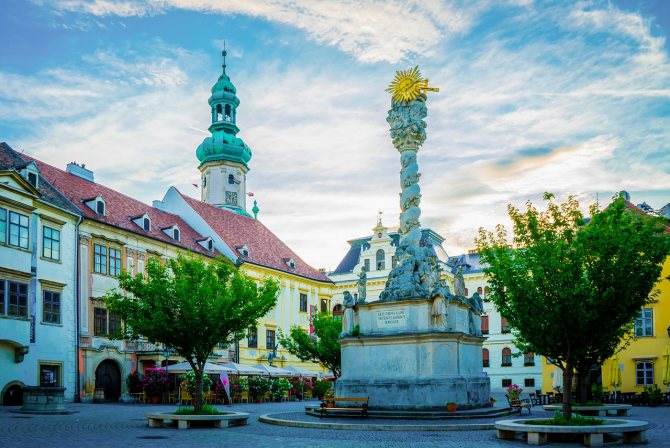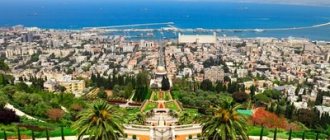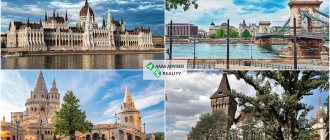Traveled: Hungary
Stories about Krasnoyarsk residents who decided to radically change their lives - go to another country, find work and housing there. In the summer of 2011, 21% of the country's population thought about emigrating. For comparison, 20 years ago there were only 5%. According to VTsIOM, the fifth part of the Russian population who wants to “get out” are mostly highly educated young people.
Many people know them in Krasnoyarsk. They still have family and friends here. But they chose to leave. Online conversation, 10 questions. Ekaterina Brus. Krasnoyarsk — Budapest.
Do you need to prepare for moving? Or is an impulsive decision the only way to leave with 100% probability?
You definitely need to prepare. You need to understand why you are leaving: from what or to what? Depending on this, build your move. And, of course, the language. At least you need to know English. Without it, there is nothing to do in European countries.
What was it like in your case?
In 2010, I went to study as an exchange student from the Siberian Aerospace University to the Budapest Business School. The program was designed for one semester, but after a couple of months of living in Hungary, I realized that I wanted to finish my studies in Europe. At the end of the semester, I began to take exams and transfer to a Hungarian university right in the middle of the academic year. I was accepted! Then I even had a year of study in France, after which I did not stay in Paris, but returned to my beloved Budapest. This summer I received my diploma and now work as a PPC Executive (Internet Marketing) in an international company.
In your case, does moving abroad mean going there? Or leave here?
Neither one nor the other. I don’t have any negative feelings towards Krasnoyarsk at all. I love my hometown very much, but I dreamed of getting a European education. And life gave me such a chance. It was strange not to use it. And in Krasnoyarsk I was not satisfied with only two things: the climate and the distance from the rest of the world.
Why this country?
I didn’t choose Hungary intentionally. It’s just that out of the programs offered at Siberian State Agrarian University, studying at a Hungarian university suited me. So let's chalk it all up to fate.
What are the five biggest differences between Russia and your new country?
- Relationship between people. The level of politeness and friendliness in Hungary is much higher. After a year spent in Budapest, I came to visit Krasnoyarsk and, out of habit, said hello to everyone in the supermarket on Pashenny. At first they looked at me as if I was sick, and then the guard even came up to make sure that we were not familiar (laughs).
— Bureaucratic systems. In Hungary, especially as a foreigner, quite often you have to deal with paperwork and registration of all kinds of documents. But it all happens much faster, and most importantly, easier. Without an arrogant and disregardful attitude.
- Price level. Life in Budapest (note, in the capital) is much cheaper than Krasnoyarsk. Despite the fact that the salary level is slightly higher than in Krasnoyarsk, the price level for everyday expenses (groceries, household expenses, rental housing, eating in a cafe/restaurant) is lower.
- Events. Budapest is a city ideal for leisure, especially for youth. Something happens every day, there really is never a dull moment here. Even in winter. Personally, I discovered theatrical life for myself. Having attended a drama production in Budapest for the first time, I realized that until that moment I knew absolutely nothing about the theater, although at home I visited Krasnoyarsk theaters quite often. Now I can say I’m a fan and I try not to miss a single premiere.
- Kitchen. Firstly, goulash is a thick soup of meat with potatoes, herbs and spices. What is called “goulash” in Russia is called “percolt” in Hungary - stewed meat. In general, one can talk endlessly about Hungarian cuisine, because to say that it is amazingly tasty is not to say a grain of truth. At first, I couldn’t pass by the Hungarian confectionery shops, because the intoxicating smell of baked goods can be felt even in the subway. Another thing I like about Hungary is the variety of dairy products. Many people know that finding cottage cheese in Europe requires some effort, but in Hungary it is available!
And, of course, we cannot fail to mention that Hungary is an empire of baths and thermal springs. The local population successfully takes advantage of this and develops sanatorium tourism. In the capital alone there are 27 year-round baths. There are also resorts throughout the country with entire thermal lakes (Heviz, Hajduszoboszló), where you can have a great rest and improve your health. Russian tourists can usually be heard in the most famous bathhouse in Budapest - Széchenyi, but few Russians travel further around the country. But in vain!
Do you feel like a stranger in a new country?
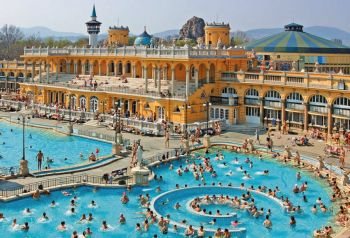
No, I don't feel it. During my stay here, I formed my own social circle and new friends: foreigners and Hungarians, communication with the latter naturally increased my level of the Hungarian language. I now speak it quite fluently, although I still sometimes write in it with errors.
Is it difficult to find work/housing?
The real estate market in Hungary has fallen in recent years. Domestic demand for housing is quite small; houses and apartments are bought mainly by foreigners. And at the moment you can buy a 1- or 2-room apartment in Budapest for the same money as in Krasnoyarsk, approximately from 60,000 euros (~2.4 million rubles, secondary market). Rent a small apartment in the center of the capital - 250-300 euros (10-12 thousand rubles) per month.
Finding a job is easy. The main difficulty is that you need to prove to the employer why they should hire you, a foreigner, and not a resident of the state. I found a job pretty quickly. Firstly, I have a sought-after specialty - Internet marketing, and secondly, I know 4 languages.
The starting salary level in Hungary (translated into rubles) is 27-30 thousand rubles. The average salary is 45-50 thousand rubles.
When leaving Russia, what/who was the hardest to part with?
I won't name anything new. The hardest thing was to part with loved ones, friends and, in general, the social circle that had developed in Krasnoyarsk. And although I am a big fan of Hungarian cuisine, I really miss delicious Krasnoyarsk sushi and ordinary buckwheat with homemade cutlets.
The economy of your life in a new country: more/less salary, more/less spending. Has it become easier to live in terms of money?
As I already mentioned, salaries here are higher and the price level is lower. Therefore, my earnings are enough for me to rent a house, do everyday shopping, and have business lunches (you can eat to your heart’s content in Budapest for 150 rubles). And allow you to travel around Europe once every 2-3 months, because a train-plane ticket costs 50-60 euros, 2-3 hours, and you are in another country.
How long have you been living in Hungary? Have you ever thought about returning to Russia?
It was my fourth year of living in Hungary, and there was no thought of returning to Russia yet. Living in the center of Europe is truly convenient and pleasant. However, I don’t forget about Krasnoyarsk, I come to Siberia every summer, and that’s quite enough for me.
Diana Shatalova Photos of Ekaterina Brus Photos of Ekaterina - Dmitry Lyamkin.
Minimum salary in Hungary
According to Eurostat statistics, less than 10% of the population works for the minimum wage in Hungary. Steel workers' salaries are higher, but not significantly higher. The difference between the minimum wage and the median income in Hungary is less than twofold.
The minimum wage is growing at a brisk pace, here is the graph for the last 20 years:
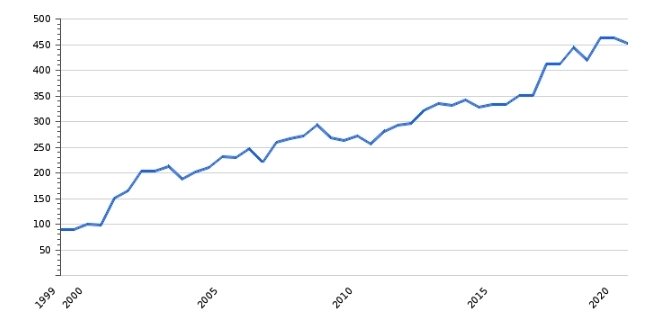
The minimum wage in the third quarter of 2021, according to Eurostat, is 452 euros per month.
In terms of our money, 40.4 thousand rubles. 3.3 times more than in Russia.
